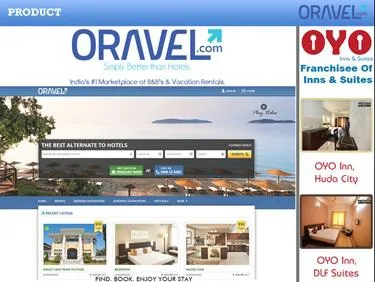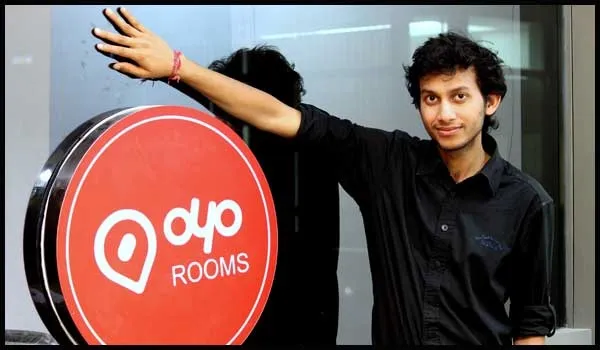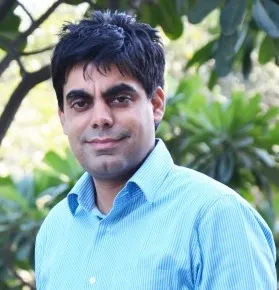How Lightspeed discovered budget hotel network Oyo and the journey thereafter
Oyo is like a first baby to me. It is special. And the tale of how we discovered it is an interesting one. Oyo did not happen through the usual prospecting methods that VCs follow. It was rather serendipitous.

I love watching Sarah Lacy's (PandoDaily) fireside chats. They throw insight into the mind of the entrepreneur/investor and tell inspiring stories. One late Saturday night, I logged onto YouTube to watch her conversation with Peter Thiel. During the chat, they talk about Peter's ‘20 Under 20 Fellowship’programme. Peter is a strong advocate of young people choosing alternative paths instead of college education. Under the programme, Peter's foundation grants USD 1,00,000 to 20 students who are under 20, to drop out of college and work on something revolutionary. I was intrigued by some of the examples (14-year-old kid building a nuclear reactor) and decided to learn more about these bold, visionary entrepreneurs who were doing amazing things instead of spending their time in college.
The current year Thiel Foundation fellows included two Indians. Ritesh was the only one doing something here in India. I reached out to him on LinkedIn and followed up with a Skype call as he was traveling to San Francisco.

The first conversation with Ritesh was mesmerising. Somewhere buried in Oravel's introductory deck was the idea of Oyo. Oravel was a plain aggregator, much like an online travel agency (OTA), but Oyo was a fully integrated model that controlled customer experience right from discovery to booking, and all the way to the stay and check-out. This 19-year-old had traveled for months staying at budget hotels, attended customer calls everyday and immersed himself in every possible experience to learn about budget hotel customers and their expectations. That was the kind of on-the-ground learning that helped him pivot Oravel to Oyo. At Lightspeed, we gravitate towards entrepreneurs who build their consumer understanding bottom-up - Ritesh clearly stood out.Subsequently, I arranged for Ritesh to meet Bejul, who was at SF as well at that time. Bejul had tracked the online travel sector for more than five years and met startups trying to connect travelers to budget hotels before. Internally, we had a point of view that a light touch aggregation approach is not likely the right one, given the nature of hotels in India. When he met Ritesh and learned about Oyo's model, which had more control over the inventory and customer experience, he believed it to be the right answer. The fact that Ritesh had arrived at this conclusion based on his market experience and had the courage and conviction to pivot from the original model gave us important insight into his 'learning orientation', a characteristic we value highly in an entrepreneur.
We decided to spend more time with Ritesh and the team at Oyo to learn about the opportunity. Quintessential to Lightspeed's diligence approach, we planned to experience, firsthand, the consumer experience at budget hotels.
That same weekend, I visited Mahipalpur - an area near the Delhi airport, which has about 50 budget hotels in a small stretch of less than two km. I knocked on the doors of eight to 10 hotels and pretended to be a medical representative who frequently travels to Delhi and is looking for reliable options at an affordable price. Learning from these conversations was mind opening in many ways.

On the demand side:
- It was extremely difficult for a consumer to gauge the experience "XYZ residency, inn" would offer. Reviews at Trip Advisor and/or pictures on OTAs would not solve experience expectation problem
- Pricing was completely arbitrary. Similar hotels at the same location would vary from Rs 1000 to Rs 2500 a night
- One could never be sure whether the booking will be honoured or not
On the supply side:
- There was a large pool of such hotels in the country
- It was clear that these hotels operated at low occupancy because of competition and a non-definitive/differentiated proposition. Also, they did not have a structured way of capturing demand
- Most of these hotels were not the primary business of the entrepreneur and a 'general manager', who usually took care of the day-to-day operations, had little incentive to increase occupancy
As I came out of Mahipalpur and watched the strip again, it finally dawned on me why an Oyo should exist for every 10 hotels in this strip. And if it did, the occupancy of the other nine hotels would gravitate towards the one Oyo, which is a national brand and one that people can trust. Today, there are more than seven Oyo hotels in the same Mahipalpur strip.
Bejul and I subsequently visited the three Oyos that were operating in Gurgaon and met their owners as well. A sleepy residential lane in Gurgaon had several of these budget-stay options, which further cemented our market depth thesis. It was also clear from our conversations with the owners that the Oyo model was working and that they therefore treated Oyo like a partner who has access to complete inventory rather than a marketing channel (e.g. OTAs). Interestingly, when we spoke to the OTAs, some of them did admit that this was a huge opportunity and they had themselves thought of capitalising on it. But it required a completely different organisation and it would be very tough to execute.
Oyo was still very young and in a state of transition:a few hotels and less than 10 people in the team, some of whom were part time and working from a different city. Ritesh and Anuj used to double up as call centre agents, business development executives and all that could possibly be there in the middle. We recognised that Oyo was in its cradle and would require enormous amount of company building. But our conviction in Oyo stemmed from our point of view of the opportunity, signs of early product-market fit, a belief in what the company could become and the clarity in Ritesh’s thinking and vision.
It has been an awesome rollercoaster ride so far. We are proud and fortunate to be a partner on this journey with Oyo, a startup that can truly claim that it is 'disrupted in India' unlike most models which become successful first in the West and then get copied here. Oyo for 'X' - primary care, diagnostics, schools, auto-service centres is quickly replacing Uber for 'X'.
Oyo will celebrate its presence in 100 cities this month. It has a world-class team that strives to make it the largest network of technology-enabled hotels in the world. Ritesh is now 21, a dreamer who operates with clarity of purpose, speed and conviction that is a defining trait of successful entrepreneurs.
Watch out for the next post in this Oyo blog series ’How Oyo built a world class team’

About the author:Maninder Gulati is a Principal at Lightspeed Advisory Services. He brings over eight years of operating, business building, entrepreneurship and consulting experience to the firm.
Prior to Lightpseed, Maninder was an Associate at McKinsey & Company working on several growth strategy and implementation engagements across various sectors including financial services, organized retail, digital music, data centers and building security/automation. Before McKinsey, he co-founded a voice based life-streaming platform – lifeinlines.com, which allowed users to create a digital diary of their life.
Maninder’s portfolio at Lightspeed includes, Oyo, Localoye, Townrush and Vee.







